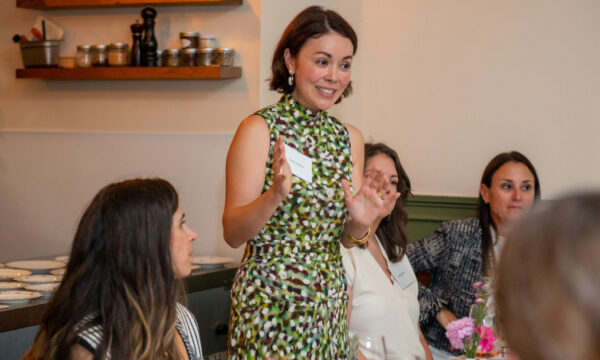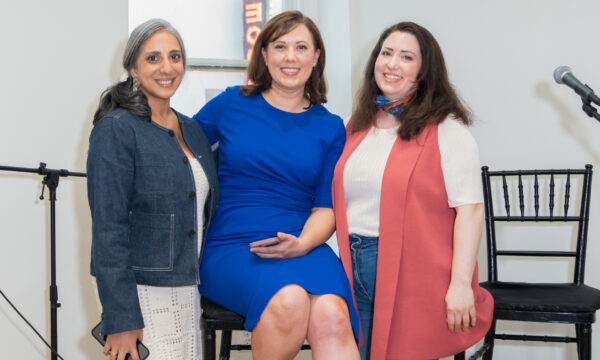
Shop This Look
There May Be a Better Way to Discipline Your Kids
An excerpt from Helen Russell’s new book, The Danish Secret to Happy Kids.
Want more M Dash?
Sign up for our weekly newsletter.
Thank you!
How do you raise children that become happy adults? Helen Russell shares her quest to find out in her new book, The Danish Secret to Happy Kids. After a decade of living and raising a family in Denmark, Russell, who is originally from the UK, noticed some major differences in the way Nordic children related to the world. So what were their parents doing differently, and was there anything the rest of us could learn?
Learn about her discoveries in her book and read on for an excerpt from her chapter on the Danish approach to discipline.
Order your copy of The Danish Secret to Happy Kids here.

Show, Don’t Tell: Discipline Danish Style
I knew I’d hit an all-time low when I threw my children’s bubble machine out the window. In the morning rush in darkest January, my children were refusing to put their shoes on. Instead, the youngest retrieved a rainbow-maned unicorn to belch soapy spheres all over the kitchen. Blissfully unaware of any urgency, they cackled with glee and leaped about as bubbles grew into shimmering, trembling balls. I got dressed to leave the house in angry, irritated movements, jerking an arm into a jacket. After the third shoe-related request, with the clock ticking toward late, I snapped. Seizing this symbol of pure joy, I opened the kitchen window and hurled it, overhand, into the inky blackness. Then I dropped everyone off and had a long, hard look at my life.
What is wrong with me?
On the street where I live, there are lots of families with young children. In summer, everyone has their doors and windows open. And I don’t hear anyone else losing their mess and screaming into the void. But on an average morning, I go up and down the stairs so many times that my Fitbit thinks I’ve done a HIIT workout, and by 7:30 a.m., I am a puree of despair.
Do Vikings just do things differently?
“Yes,” says Niki Brantmark in Sweden. Originally from London, Niki relocated to Skåne in 2004 with her Swedish husband. She now has two daughters, a stepson, and an interiors empire (myscandinavianhome.com). “Everyone is just so calm here! They rarely raise their voices!” She sounds baffled. “Swedes often have this very soothing, pedagogical almost, voice. I don’t know how they do it. They always reason with children and try to be really fair. I’ve seen a child slap her father and still no raised voice! Whereas when we grew up… Well, I have memories of being chased up the stairs.”(1)
I tell Niki about my morning, and she tells me that her neighbor’s daughter locked herself in the shed, making them late for work and school respectively.
“I asked my neighbor, ‘Did you lose your shit?’ But no, she told me, ‘I just kept really calm—then I might bring it up the next day with something gentle like, “It wasn’t so nice, was it, when this happened. How did you feel?”’ They always keep their cool.”
“And…what about shoes?” I ask. “Don’t you have shoe wars in your house?”
“No. We use a horn.”
“Sorry?”
“Everyone does in Sweden—schools, day cares, you see them everywhere. It’s much easier with a shoehorn. Try it!”
I tell her it’s worth a go. “But what about when you’re trying to get children to do something they don’t want to do?” I ask.
“They just…don’t! I’ve witnessed a couple of instances where if a kid doesn’t want to go to school, sometimes they don’t go.” This isn’t a daily occurrence “and it’s usually among younger kids.” But still. “Giving kids a feeling that they are equals and that they get to make decisions is key.”
Every Swede I ask about this concurs, and there’s a similar approach in Denmark.
“The Danish way isn’t to focus on behavior, unlike in the UK and US,” says family therapist Sofie Münster, who studied in the US. “In Denmark, we focus on what is behind that behavior. I’d think, ‘What is the child trying to tell me?’ So instead of a time-out, we would think, ‘This child is really angry.’ And then say to the child, ‘I can see you’re angry with me because I’m saying no, and that is really hard for you.’” By saying this, we “nourish the attachment bond” rather than depleting it. “Because what is the logical conclusion of the alternative? Does the child end up thinking, ‘I will only be loved when I’m behaving well’? Or that ‘when I am annoying or difficult, I’m going to have to deal with it by myself’? That ‘I have to be alone with those hard feelings’? Over time,” says Sofie, “this makes a child even more angry.”(2)
“We also don’t do ultimatums,” says my friend Rikke with the twinkly eyes, “since with ultimatums, there has to be a winner and a loser.”
“No ultimatums?”
“But there is always a cause and effect,” she adds.
“So if children won’t put on shoes…just off the top of my head…”
“I’ll tell them, ‘If you don’t put on your shoes, we’ll be late for school,’ because that’s true. But I also know that when I go over, lay a hand on them, and remind them gently, they may respond better. And if a child is too tired or the fastenings on their shoes are too fiddly, then of course they’re going to resist. Also, have you tried a shoehorn?”
*Deep exhale*
Nordic parenting fosters the notion that the child is essentially good and that there’s always a reason for resistant behavior—from hunger to tiredness, boredom, or lack of a shoehorn.
“The Danish way is to reduce the friction for children,” says Rikke.
“Isn’t that being a helicopter parent?” I ask.
“You mean curling?”
“Do I?”
“Don’t you?”
I discover that what the rest of the world refers to as helicopter parenting, Danes call curling, likening the niche sixteenth-century Scottish broom sport to smoothing the way for a child. Obviously.
“I don’t see reducing friction as curling,” says Rikke. “I think much of kids’ lack of self-sufficiency is actually because of us—overscheduling so they’re tired or putting the stuff they need out of reach or clearing it away unduly. We know by age three that kindergarteners can do a lot themselves. Danish winter clothes are specifically designed so that the kids can put them on unaided.”
Another reason my stinky Paddington duffel coat fell at the first hurdle, I think: too many toggles!
“If kids aren’t being self-sufficient,” says Rikke, “we can look for the points of friction and try to be patient.” She tells me how until recently, she poured the milk on her eight-year-old son’s cereal. “I did it because I couldn’t face him doing it, spilling it, then trying to clean it up, not cleaning up right, leaving out a dirty cloth…you get the picture.”
I do.
“I would think, ‘I don’t have a mental capacity for this today.’”
This sounds familiar.
“It became a habit that I would pour the milk for him. But I had to let go—to let him do it, make a mess, and learn. It’s the same with many things.”
Rikke’s husband comes from the UK and can occasionally be exasperated by the Danish way.
“He might say to our son, ‘By your age, you should be able to do X, Y, and Z.’ Because that’s how it is in the UK. But how should kids know if we don’t take the time to teach them? Or make sure they understand?”
“In the Danish way, there is a focus on the process,” family therapist Sofie explains, “so children have to learn to do certain things. But we acknowledge that it can be hard for them. And they may not get there as fast as we want or expect them to! So I’m very thoroughly focused on going slow and coaching children through things. You actually save time by giving time.”
“Really?” She can hear the skepticism in my voice.
“Well, I have a three-year-old, so let’s talk about her. If you think about it, impatience and conflict actually take longer. So for example, if I’m trying to get my daughter to put her shoes on in the morning—”
“Yes! Thank you!” I feel seen.
“Well, if I give her, say, thirty seconds to get used to the idea of putting her shoes on, I’m also investing in her learning this skill. I’m being with her in the here and now and helping her regulate a difficult emotion.”
The difficult emotion of “I don’t want to wear shoes”? What is it with kids and shoes?
“The grown-up is taking the lead, telling the child, ‘You have to learn it, but I’ll be with you until you understand.’”
There’s an acceptance in Denmark that when children are preoccupied, they aren’t going to listen. And this is okay, allegedly. We can’t get mad at them, say my Danish friends, since when we do, they can’t actually hear us.
How convenient, I think at first. But there’s science here. Brain scans show that getting told off activates the more primitive parts of the brain, causing children to feel threatened and go into a defensive position. In this state, children have no capacity to relate to what parents are demanding.(3)
The late Danish family therapist Jesper Juul popularized Nordic ideas of nonauthoritarian parenting in his 1995 book Your Competent Child.(4) He wrote that values like obedience and conformity governing traditional hierarchical families were now outdated, explaining how children parented “the old way” might end up complying but would lose far more in the long term. “To defend punishment by claiming its efficacy is mistaken,” he writes, since “children willingly cooperate with any adults they love, trust, and depend on. No matter how the adult behaves.”
Earlier theories of parenting were based on the idea that adults had to teach children how to cooperate, adapt, and take others into consideration. But forty years of research into families shows that when children have to choose between preserving their own integrity and cooperating, children choose cooperation 90 percent of the time, according to Jesper. In other words, most children already want to fit in and please their parents. What they need help with is learning to be themselves.
To read the rest, order your copy of The Danish Secret to Happy Kids here.
Notes
(1) “Everyone is just so calm here”: Niki Brantmark, in discussion with the author, October 28, 2022.
(2) “The Danish way isn’t to focus”: Münster, discussion.
(3) Brain scans show that getting told off: Daniel J. Siegel and Tina Payne Bryson, The Whole-Brain Child: 12 Revolutionary Strategies to Nurture Your Child’s Developing Mind (New York: Bantam Books, 2012), 42; Daniel J. Siegel and Tina Payne Bryson, No-Drama Discipline: The Whole-Brain Way to Calm the Chaos and Nurture Your Child’s Developing Mind (New York: Bantam Books, 2016).
(4) Danish family therapist Jesper Juul: Jesper Juul, Your Competent Child: Toward a New Paradigm in Parenting and Education (Bloomington, IN: Balboa Press, 2011), 38.










